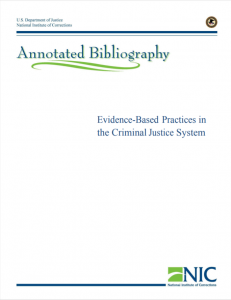Domestic Violence Risk Appraisal Guide (DVRAG)
Le DVRAG est un outil d’évaluation actuariel des risques de violences domestiques de 14 éléments conçu pour identifier le niveau de risque posé par les auteurs masculins de violence conjugale (IPV- Inmate partners Violence) (Hilton et al. 2008).
Le DVRAG fait partie d’un système qui inclut l’Ontario Domestic assault Risk assessement (ODARA) (Hilton et al., 2004), une version plus courte de la DVRAG doit être utilisé par les agents de première ligne pour aider à la prise de décision, comme la sortie sous caution (Hilton et al., 2008).
D’autre part,le DVRAG fournit une évaluation plus complète (Hilton et al., 2010).
Le DVRAG comprend les 13 items de l’ODARA plus un score de la PCL-R (outil d’évaluation des personnalité à expression psychopathiques).
L’élaboration d’une mesure actuarielle pour évaluer le risque de violence conjugale, en particulier, a été largement inspiré par le succès du VRAG pour évaluer le risque de future attaque de paretanires fiminines dans les auteurs d’IPV (Hilton et al., 2001). En fait, il a été dénommé DVRAG pour refléter sa connexion avec le VRAG (Hilton et al. 2008) et il partage plusieurs points communs dans la façon de le côter avec ses prédécesseurs.
Par exemple, tous les instruments comprennent des mesures de l’histoire clinique et la PCL-R (Hilton et al., 2010). Le DVRAG a démontré sa capacité précoce à discriminer des groupes de délinquants à risque élevé et faible pendant la standardisation de l’outil.
(Hilton et al., 2010). Comme l’ont souligné Hilton et al. (2010), les éléments spécifiques incluent :
| ITEMS de la DVRAG |
| (1) Nombre d’incidents antérieurs de violence domestique: Cet item couvre tous les précédents de cas d’agression physique par l’auteur contre une actuelle / précédente partenaire, ou de ses enfants, avec qui il a cohabité. Les incidents doit avoir eu lieu à une date distincte de l’agression incriminée et doivent être enregistrés dans un rapport de police ou au casier judiciaire; |
| (2) Nombre d’incidents antérieurs non-domestiques: cela inclut les agressions physiques par l’agresseur contre des victimes autres que la partenaire actuelle ou les précédentes avec qui il a cohabité, ou de leurs enfants, qui ont eu lieu avant l’agression incriminée |
| (3) Précédente détention de 30 jours ou plus: L’item est comptabilisé si le délinquanta déjà été sanctionné et incarcéré pendant au moins 30 jours avant l’agression incriminée; |
| (4) Échec antérieur de la libération conditionnelle : Cet élément doit être noté « Non » si le le délinquant n’était pas en libération conditionnelle au moment de l’agression et /ou n’a pas d’antécédents de non-respect des conditions de libération conditionnelle; |
| (5) Menaces de blesser ou de tuer lors de l’agression incriminée: Cet item est noté si l’auteur a menacé de blesser à d’autres personnes sur l’agression incriminée. Il peut aussi être comptabilisé si l’auteur a déjà été accusé d’une infraction pour menace ou équivalent; |
| (6) Séquestration du partenaire lors de l’agression incriminée: Cet item doit être côté positivement si l’auteur a confiné la victime à une zone verrouillée, ou barricadée, ou a empêché physiquement la victime de partir pendant l’agression incriminée; |
| (7) Préoccupation de la victime: Cette variable devrait être côtée positivement si la victime féminine de l’agression incriminée a verbalement déclaré qu’elle était préoccupée, qu’elle avait peur, était inquiète, que l’auteur l’agresserait elle ou ses enfants à l’avenir; |
| (8) Nombre d’enfants: cela comprend le nombre d’enfants mineurs (vivants) ou d’enfants adultes ou les enfants adoptés de l’auteur, ainsi que les enfants supplémentaires de la victime; |
| (9) Les enfants biologiques de la victime d’un partenaire précédent: Cet item se rapporte à tous les enfants biologiques mineurs ou adultes de la femme victime de l’agression incriminée, dont le père n’est pas l’auteur. Les enfants adoptés ne doivent pas être inclus; |
| (10) La violence à l’égard d’autres personnes: Cet item est scoré si l’auteur de l’infraction a des précédents d’agression violentes non conjugales antérieures à l’agression incriminée . L’infraction n’a pas besoin d’être officiellement enregistré dans un rapport de police ou des documents du tribunal; |
| (11) Score d’abus de substance: cette variable est basée sur le nombre de facteurs présents qui indiquent des problèmes de toxicomanie; |
| (12) Agression contre une victime enceinte: cet élément est marqué indépendamment du fait que l’agression reportée ait été enregistré ou non dans un rapport de police; |
| (13) Nombre d’obstacles au soutien des victimes: cet item fait référence au nombre d’obstacles présents qui entravent l’accès de la victime aux services de d’aide. |
(14) Score à la PCL-R (outil d’évaluation des personnalités à expression psychopathiques): comme dans les autres cas, un précédent score PCL-R (documenté) peut être utilisé s’il existe des informations insuffisantes disponibles.
|
|
L’évaluateur score le DVRAG selon une feuille de codage fournie.
Pour commencer, l’examinateur parcourt la liste des options possibles de cotation et selectionne en fonction des informations disponibles.
Les scores des items sont additionnés pour un aboutir à score total final.
L’étendu possible de scores sur le DVRAG varie de -10 à +46.
Le score total est traduit en utilisant un tableau fourni avec la mesure qui indique la probabilité de récidive de l’auteur.
Le score et la probabilité de récidive peuvent être utilisés pour des mesures de prévention et de protection, comme la détermination de l’intervention adéquate et des ressources nécessaires pour prévenir la violence future (Hilton et al., 2010).
Des scores plus élevés reflètent généralement un risque plus élévé, bien que le DVRAG ne peut pas réellement fournir des estimations quant à la probabilité d’agressions mortelles .
Cependant, la présence de facteurs supplémentaires peut indiquer un motif accru d’inquiétude, telle que l’utilisation d’armes à feu, la fin de la relation et / ou la victime ayant un nouveau partenaire (Hilton et al. 2010)
lien





